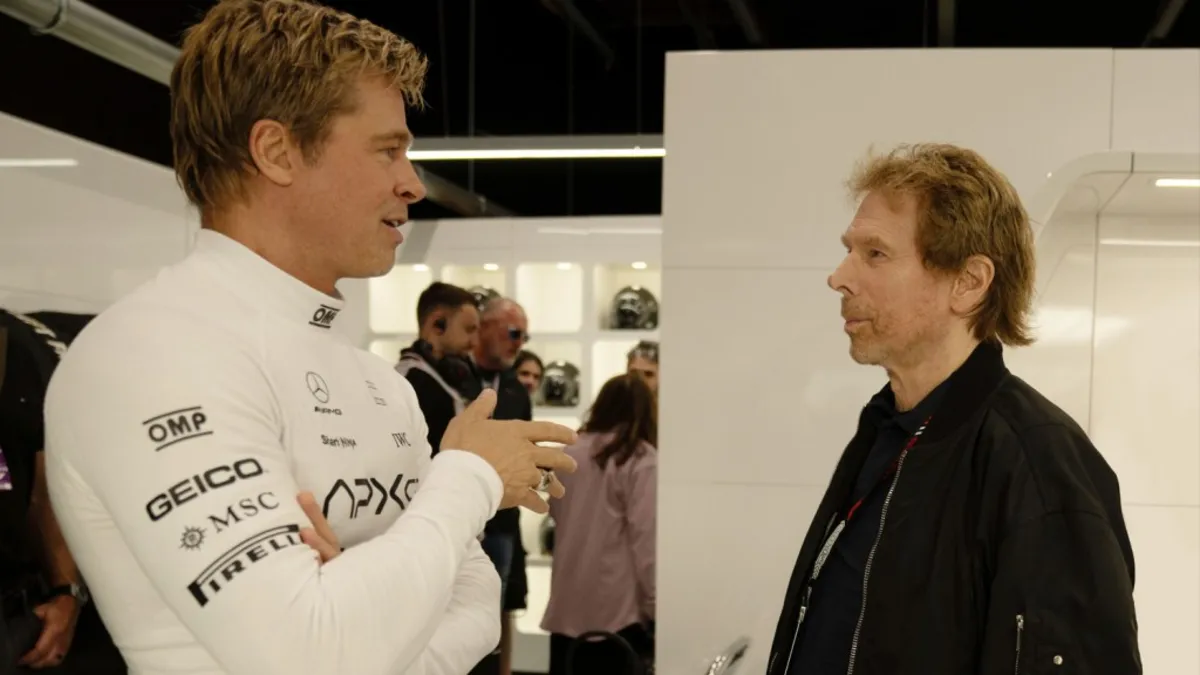
Celebrating 50 years in the film industry, Jerry Bruckheimer has solidified his reputation as a powerhouse producer. Transitioning from Madison Avenue to Hollywood, Bruckheimer has been at the helm of blockbuster franchises that have collectively grossed billions at the box office. His name has become synonymous with quality entertainment, often appearing in ad spots, a rarity for producers. Bruckheimer attributes his success to a fundamental skill: problem-solving.
The recent premiere of F1 at Radio City Music Hall showcased the film's star, Brad Pitt, grappling with a significant creative challenge. At 60, how could audiences believe Pitt was a credible competitor in a high-stakes Formula One race? Notably, champion driver Lewis Hamilton, who serves as the film's guiding star, was just 36 during his last championship win. The oldest Formula One champion was Luigi Fagioli, who triumphed at 51 in the 1951 French Grand Prix. However, this was merely another day at the office for Bruckheimer and his collaborative team, which included Apple’s creative squad and director Joseph Kosinski.
In an exclusive interview with Deadline, Bruckheimer discussed the universal appeal of race car films. They offer a unique thrill, capturing the excitement of racing at speeds of 200 MPH. While past films like Rush, Ferrari, and Ford v Ferrari have struggled to attract massive audiences, Bruckheimer is confident that F1 will resonate globally, thanks in large part to the star power of Pitt and the talent of Kosinski, known for his work on Top Gun: Maverick.
At the core of F1 lies a compelling narrative about redemption and teamwork, themes that resonate with audiences of all ages. “We all want second chances,” Bruckheimer notes, emphasizing the film's emotional depth amidst the thrill of racing. The film captures the journey of characters who transition from adversaries to allies, mirroring our collective desire for collaboration in a chaotic world.
Despite the physical demands of portraying a race car driver, Pitt's passion for motorsports shines through. Bruckheimer explained that Pitt has long been an enthusiast, showing a keen interest in the genre. The production team, including Hamilton and screenwriter Ehren Kruger, crafted a narrative that excited Pitt enough to commit to the project.
Comparing the technology used in F1 to earlier films like Days of Thunder, Bruckheimer emphasized the advancements in filmmaking. The innovative use of smaller, more versatile cameras allowed for dynamic shots that previously would have been impossible. Collaborating with Mercedes, the team designed a bespoke car for the film, enhancing the authenticity of the racing experience.
Unlike traditional sports, Formula One features an intriguing competitive dynamic where teammates are also rivals. Bruckheimer noted that this inherent conflict creates significant drama, providing a rich backdrop for storytelling. The film's plot originated during the pandemic when Kosinski became captivated by the lesser-known teams in the Drive to Survive series, leading to a narrative focused on an underdog team striving for victory.
Lewis Hamilton played a pivotal role in bringing F1 to life. He unlocked access to Mercedes and facilitated connections with key figures in the Formula One world. Bruckheimer described how Hamilton's involvement added credibility and enthusiasm to the project, ultimately convincing Pitt to join the film.
In preparation for the high-speed scenes, Pitt and the cast underwent rigorous training to endure the physical demands of racing. Bruckheimer revealed that the actors trained for four months, gradually progressing from road cars to F3 and finally to their custom-built vehicles. This attention to detail ensured that the actors could genuinely embody their characters, enhancing the film's realism.
Bruckheimer reflected on his earlier collaborations with his late partner, Don Simpson, highlighting the balance of their skills. Simpson was a master storyteller, while Bruckheimer focused on the execution of those stories. After Simpson’s passing, Bruckheimer faced skepticism about his ability to continue producing hits. However, successful projects like Con Air and the Pirates of the Caribbean series proved his capabilities.
In an era dominated by franchises and sequels, Bruckheimer's commitment to original content like F1 showcases the potential for fresh storytelling. He acknowledged the difficulties of launching original intellectual property (IP) but emphasized the importance of creating engaging narratives that resonate with audiences. F1 aims to bridge the gap between theatrical releases and streaming, potentially setting a precedent for future films.
Bruckheimer expressed optimism about F1’s potential to revitalize interest in theatrical releases amid the growing trend of streaming. With Apple’s backing and a major theatrical push, F1 aims to capture the zeitgeist, much like the success of Top Gun: Maverick. He hopes that audiences will embrace this film as a thrilling and emotional journey.
As the landscape of filmmaking continues to evolve, Jerry Bruckheimer remains at the forefront, proving that with a blend of determination, creativity, and collaboration, the magic of cinema can thrive.